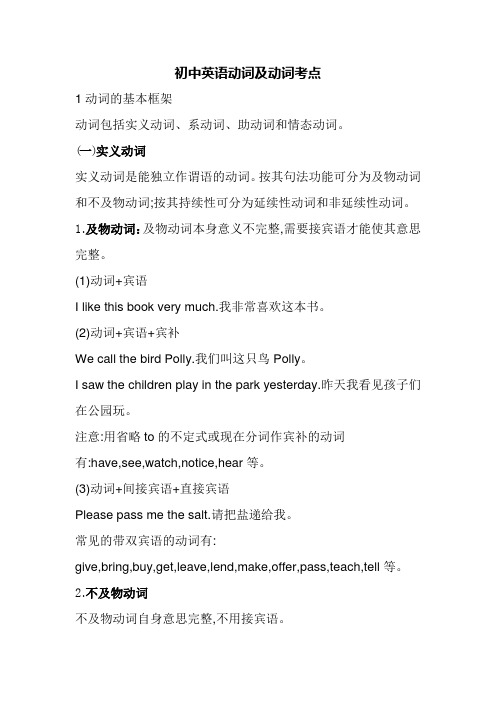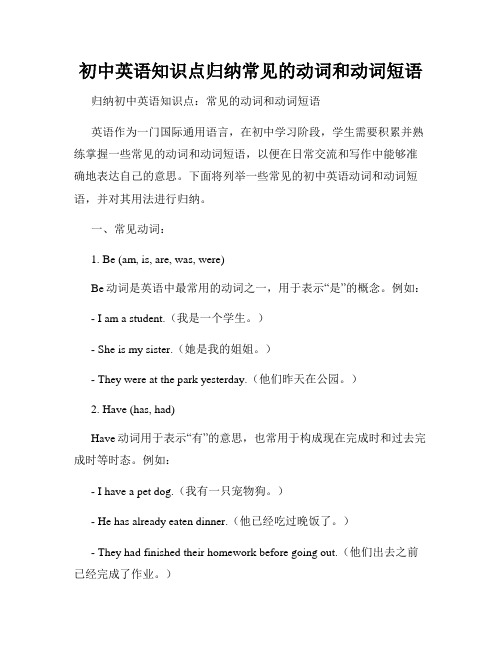初中英语动词的用法总结
- 格式:doc
- 大小:37.00 KB
- 文档页数:7

初中英语动词及动词考点1动词的基本框架动词包括实义动词、系动词、助动词和情态动词。
(一)实义动词实义动词是能独立作谓语的动词。
按其句法功能可分为及物动词和不及物动词;按其持续性可分为延续性动词和非延续性动词。
1.及物动词:及物动词本身意义不完整,需要接宾语才能使其意思完整。
(1)动词+宾语I like this book very much.我非常喜欢这本书。
(2)动词+宾语+宾补We call the bird Polly.我们叫这只鸟Polly。
I saw the children play in the park yesterday.昨天我看见孩子们在公园玩。
注意:用省略to的不定式或现在分词作宾补的动词有:have,see,watch,notice,hear等。
(3)动词+间接宾语+直接宾语Please pass me the salt.请把盐递给我。
常见的带双宾语的动词有:give,bring,buy,get,leave,lend,make,offer,pass,teach,tell等。
2.不及物动词不及物动词自身意思完整,不用接宾语。
Horses run fast.马跑得快。
(1)有些动词既可作及物动词又可作不及物动词。
We study English.我们学习英语。
(及物动词)We study hard.我们努力学习。
(不及物动词)(2)有些不及物动词与一些别的词搭配在一起构成动词短语,它的作用相当于一个及物动词。
①动词+介词Listen to the teacher carefully.仔细听老师讲。
此类动词短语后面的宾语无论是名词还是代词,都只能放在介词后面,不能放在动词和介词之间。
②动词+副词+介词Let’s go on with our work!让我们继续我们的工作吧!He gets along well with his classmates.他与他的同学们相处得很好。

初中英语知识归纳常用动词短语和名词短语的搭配和用法在初中英语学习中,动词短语和名词短语的正确搭配和使用是非常重要的。
本文将归纳总结一些常用的动词短语和名词短语,以帮助同学们更好地掌握它们的用法。
一、常用动词短语的搭配和用法1. take care of:照顾,照料例句:My mother always takes care of me when I am sick.(我生病时,妈妈总是照顾我。
)2. go for:喜欢,追求例句:I really go for that new movie.(我真的很喜欢那部新电影。
)3. get along with:与...相处,和...友好相处例句:She gets along with her classmates very well.(她和她的同学相处得很好。
)4. look forward to:期待,盼望例句:I am looking forward to the summer vacation.(我期待着暑假的到来。
)5. make up:编造,组成例句:He always makes up excuses for being late.(他总是为迟到编造借口。
)6. give up:放弃例句:Don't give up even when things get tough.(事情变得困难时也不要放弃。
)7. put off:推迟,延迟例句:The meeting was put off until next Monday.(会议被推迟到下周一。
)8. catch up with:迎头赶上,赶上某人例句:He ran fast to catch up with his friends.(他跑得很快,赶上了他的朋友们。
)二、常用名词短语的搭配和用法1. a piece of:一片,一块例句:Please give me a piece of paper.(请给我一张纸。

初中英语知识点归纳动词和形容词的搭配用法初中英语知识点归纳:动词和形容词的搭配用法英语学习中,动词和形容词的搭配用法非常重要,正确的搭配能够使句子更加地生动有趣。
本文将为大家归纳一些初中阶段常用的动词和形容词的搭配用法,希望能够帮助大家更好地掌握这些知识点。
一、动词搭配用法:1. do one's best 尽力而为He always does his best to help others.2. make a decision 做出决定We need to make a decision before it's too late.3. take a break 休息一下After studying for hours, he decided to take a break.4. give advice 提建议She gave me some good advice on how to improve my English.5. have a chat 聊天We often have a chat after school.6. keep a promise 守诺言You should always keep your promise.7. take a walk 散步It's a nice day, let's take a walk in the park.8. pay attention 注意Please pay attention to the teacher in class.9. play a role 扮演角色She plays the role of a princess in the school play.10. make a mistake 犯错误Everyone makes mistakes, so don't be too hard on yourself.二、形容词搭配用法:1. be nervous about 对...感到紧张He is nervous about the upcoming exam.2. be interested in 对...感兴趣I am interested in learning about different cultures.3. be good at 擅长She is good at playing the piano.4. be proud of 以...为自豪I am proud of my younger sister for getting into the university.5. be worried about 担心She is worried about her grades.6. be excited about 对...感到兴奋We are excited about going on a school trip next week.7. be upset about 对...感到不快He is upset about not receiving an invitation to the party.8. be surprised at 对...感到惊讶I was surprised at his sudden success.9. be satisfied with 对...感到满意She is satisfied with her test results.10. be disappointed in 对...感到失望I am disappointed in my own performance in the competition.总结:掌握动词和形容词的搭配用法,可以使我们的英语表达更加准确、地道。

初中英语知识点归纳常见的动词和动词短语归纳初中英语知识点:常见的动词和动词短语英语作为一门国际通用语言,在初中学习阶段,学生需要积累并熟练掌握一些常见的动词和动词短语,以便在日常交流和写作中能够准确地表达自己的意思。
下面将列举一些常见的初中英语动词和动词短语,并对其用法进行归纳。
一、常见动词:1. Be (am, is, are, was, were)Be动词是英语中最常用的动词之一,用于表示“是”的概念。
例如:- I am a student.(我是一个学生。
)- She is my sister.(她是我的姐姐。
)- They were at the park yesterday.(他们昨天在公园。
)2. Have (has, had)Have动词用于表示“有”的意思,也常用于构成现在完成时和过去完成时等时态。
例如:- I have a pet dog.(我有一只宠物狗。
)- He has already eaten dinner.(他已经吃过晚饭了。
)- They had finished their homework before going out.(他们出去之前已经完成了作业。
)3. Do (does, did)Do动词常用于构成否定句、疑问句和一般疑问句等句子结构中。
例如:- I don't like coffee.(我不喜欢咖啡。
)- Does she play the piano?(她会弹钢琴吗?)- Did you go to the park yesterday?(你昨天去了公园吗?)4. Go (goes, went, gone)Go动词表示“去”的动作,也常用于构成进行时态和完成时态等句子。
例如:- I go to school by bus.(我坐公交车去上学。
)- She often goes swimming on weekends.(她经常在周末去游泳。

初中英语动词用法分类在初中英语的学习中,动词是至关重要的一部分。
掌握动词的用法,对于理解句子结构、准确表达意思以及提升英语语言能力都有着关键作用。
接下来,让我们一起对初中英语动词的用法进行分类和探讨。
一、实义动词实义动词是表示具体动作或状态的动词,能够独立作谓语。
1、及物动词及物动词后面需要接宾语,才能完整地表达一个动作。
例如,“I love English” 中的“love”就是及物动词,“English”是它的宾语。
常见的及物动词有“eat”(吃)、“read”(读)、“write”(写)等。
2、不及物动词不及物动词后面不需要接宾语就能表达完整的意思。
比如,“The bird flies” 中的“flies”就是不及物动词。
常见的不及物动词有“come”(来)、“go”(去)、“sleep”(睡觉)等。
二、系动词系动词用于连接主语和表语,表示主语的身份、性质、状态等。
常见的系动词有:1、 be 动词(am/is/are/was/were)这是最常见的系动词,例如,“I am a student”2、感官动词如 look(看起来)、sound(听起来)、smell(闻起来)、taste (尝起来)、feel(感觉起来)。
例如,“The flower smells sweet”3、表示变化的动词如 become(变得)、get(变得)、grow(生长,变得)、turn(变得)等。
比如,“It gets colder and colder”三、助动词助动词主要用于构成各种时态、语态、语气等。
常见的助动词有:1、 do/does/did用于一般现在时和一般过去时的否定句和疑问句中。
例如,“Do you like music?” “He doesn't like sports” “Did she go to the party?”2、 have/has/had用于构成现在完成时和过去完成时。
如,“I have finished my homework” “They had left before I arrived”3、 be 动词(am/is/are/was/were)用于进行时态和被动语态。

初中英语常用的动词用法初中英语常用动词用法:1. allow sb. to do sth. 允许某人去做某事My father allowed me to go out for a walk after finishing my homework.2. asked sb. (not) to do sth. 叫某人做事某事(叫某人不要去做某事)My father asked me to study hard.He asked me not to swim alone.be asked to do sth. 被叫去做某事/被邀请去做某事I was asked to have a dinner with them yesterday.3. be afraid to do sth. 害怕做某事She is afraid to ask me questions.4. be afraid of doing sth. 害怕做某事I am afraid of going out at night.5. be afraid of sth. 害怕某物He is afraid of snakes.6. be amazed to do sth. 对做某事感到惊讶He was amazed to meet the girl there.be amazed at sth. 对某事感到惊讶they were amazed at the news7. be busy doing/with sth. 忙于做某事 (常考)e.g: I was busy washing my car at that time. 那时候我正忙于清洗我的车子。
I am busy with my work.8. be ing/going/leaving/flying/moving/dying(某些位移动词用进行时态时表将来)the bus is ing/the dog is dying.9. be excited to do sth. 对做……感到兴奋Jacky was excited to travel there by plane.be excited at sth.Lily was excited at his words.be excited about doing sth.he was excited about passing the exam without going overing books.10. be frightened to do sth. 害怕去做某事Sam is frightened to ride a horse.11. be glad/happy to do sth. 高兴去做某事she is happy to clean the blackboard with me.be pleased to do sth. 高兴做某事she was pleased to help the old man yesterdaybe pleased with sth. 对某事感到高兴/满意the teacher was pleased with my answer.12. be interested in sth./doing sth. 对某事感兴趣/对做某事感兴趣she is interested in swimming in the river.My brother is interested in Chinese.13. be/get ready for/to do sth.Be ready for sth. 为某事做好了准备We are ready for the exam.Be ready to do sth. 为做某事做好了准备We are ready to have a birthday party for her.get ready for sth.为某事在做准备We are getting ready for the exam.13. be sorry to do sth. 对做某事感到抱歉14. be surprised to do sth. 对做某事感到惊奇be surprised at sth. 对某事感到惊奇15. be worth doing sth. 值得做某事 (worth 后接动词-ing 形式,常考)16. begin to do sth.begin/start to do/doing sth.17. can/be able to afford (to buy) sth. 有能力购买(供)……18. can/may/must do sth. could/would/should/might do sth.19. can't wait to do sth. 迫不急待地去做某事20. decide to do sth. 决定去做某事make up one's mind to do sth. 下决心去做某事 (常考)make a decision to do sth. 对做某事作出决定21. deserve to do sth. 值得/应该做……22. encourage sb. to do sth.鼓励某人去做某事23. enjoy doing sth. 乐意去做某事24. expect (sb.) to do sth. 期望去做某事25. fail to do sth. 做某事失败succeed doing sth. 成功做了某事26. finish doing sth. 做完某事(后接动词-ing形式) (常考)27. follow sb to do sth. 跟随某人去做某事28. get sb. to do sth.make sb. do sth.let sb. do sth.29. get/have a chance to do sth.得到一个做某事的机会30. give/pass/show/lend/sell sb. sth./ sth. tosb.buy/get/bring sb. sth. / sth. for sb.31. go on to do sth. 继续做事(常考)go on doing sth. 继续做事(常考)32. hate to do/doing sth. 讨厌/不喜欢做某事33. have fun doing sth.34. have problems doing sth.做某事遇到困难35. have sb. do sth.have sth. donehave sth. to do 有事要做36. hear sb. do sth. 听到某人做某事(后接动词原形,常考)hear sb. doing sth. 听到某人正在做某事(常见)37. help to do sth. 帮忙做某事help sb. (to) do sth.帮助某人做某事38. hope/wish to do sth. 希望做某事wish sb. to do sth. 希望某人做某事39. I t seems that 这像是……(后接从句)seem to dosth.seem +adj.40. It's + adj.+(for sb.) to do sth.It's + adj. +(of sb.) to do sthe.g: It's glad for him to hear the news.41. It takes sb. some time/money to do sth. 花费某人多长时间做某事(常考)42. pay …for…costspend…on…..it take …to do sth.43. It's best for sb to do sth.. 对某人来说做某事是最好的had better do sth. 最好做某事 (注意had没有时态和人称的变化,better后接动词原形)44. It's time for sb. to do sth. 是某人做某事的时候了45. keep (on)doing sth. 坚持做某事(常考)keep sb. doing sth. 让某人做某事(常考)keep sb. from doing sth. 阻止某人做某事(常考)keep sb./ sth. +adj.keep the book for 2 days 借这本书两天(不要用borrow或lend)46. learn to do sth. 学做某事learn sth. from sb. 向某人学习47. like to do/doing sth. 喜欢做某事like sb. to do sth. 喜欢某人做某事48. need to do sth.need doing sth./to be doneneedsth .needn't do sth.49. prefer to do sth. rather than do sth. 宁愿……而不愿……(常考)prefer doing sth. to doing sth. 喜欢做……胜过做……e.g: I prefer reading books to going shopping. 比起购物来,我更爱读书。
初中英语知识点归纳动词和动词的搭配用法初中英语知识点归纳:动词和动词的搭配用法动词是英语语法中的重要组成部分,通过不同的动词搭配,我们可以表达不同的意义和强调。
在初中英语学习中,掌握动词及其搭配用法是提高语言表达能力的关键。
本文将对初中英语中常见的动词及其搭配用法进行归纳总结。
1. 一般动词的基本用法一般动词指的是不需要加上其他助动词或情态动词的动词,如go (去)、learn(学习)、eat(吃)等。
这些动词在句子中常用作谓语动词,表达主语的动作或状态。
例句:- I go to school every day.(我每天去学校。
)- They learn English in the evening.(他们晚上学习英语。
)- She eats fruit for breakfast.(她早餐吃水果。
)2. 动词+副词的搭配用法副词可以强调或修饰动词的动作或状态,常放在动词之后。
常见的动词+副词搭配用法有:look after(照顾)、give up(放弃)、turn on (打开)等。
例句:- My sister looks after our pet dog.(我妹妹照顾我们的宠物狗。
)- Don't give up easily.(不要轻易放弃。
)- Please turn on the lights when you enter the room.(进入房间时请打开灯。
)3. 动词+介词的搭配用法介词能够与动词形成固定搭配,表达特定的意义。
常见的动词+介词搭配用法有:listen to(听)、belong to(属于)、look for(寻找)等。
例句:- We often listen to music in our free time.(我们在空闲时间经常听音乐。
)- This book belongs to me.(这本书是我的。
)- I am looking for my keys.(我在找我的钥匙。
初中英语动词及其用法在初中英语的学习中,动词无疑是非常重要的一部分。
动词不仅在句子中充当着核心成分,其用法也是多种多样,掌握好动词及其用法对于提高英语语言能力至关重要。
首先,我们来了解一下什么是动词。
动词是表示动作或状态的词汇。
比如“run(跑)”“eat(吃)”“sleep(睡觉)”等表示动作,“be(是)”“seem(似乎)”“stay(保持)”等表示状态。
动词有着不同的分类。
按照动作发生的时间,可分为一般现在时、一般过去时、一般将来时、现在进行时、过去进行时、现在完成时和过去完成时等。
一般现在时中,当主语是第三人称单数时,动词要发生相应的变化。
例如,“He studies hard”(他学习努力。
)中的“study”就要变成“studies”。
而在一般过去时中,动词通常要变成过去式,比如“play”变成“played”,“go”变成“went”。
一般将来时常用“will +动词原形”或者“be going to +动词原形”的结构来表示。
如“We will have a party next week”(下周我们将举办一个聚会。
)“I am going to visit my grandparents tomorrow”(明天我打算去看望我的祖父母。
)现在进行时的结构是“be +动词的现在分词”,比如“He is reading a book now”(他现在正在读一本书。
)过去进行时则是“was/were +动词的现在分词”,“They were playing football at that time”(那时他们正在踢足球。
)现在完成时的结构是“have/has +过去分词”,“I have finished my homework”(我已经完成了我的作业。
)过去完成时是“had +过去分词”,“By the end of last year, we had learned 2000 words”(到去年年底,我们已经学了 2000 个单词。
初中英语be动词的用法总结一、be动词的形式1. am:用于第一人称单数(I)2. is:用于第三人称单数(he, she, it)3. are:用于第二人称单数(you)和第一、第二、第三人称复数(we, you, they)二、be动词的用法1. 表示状态He is a teacher.他是一名老师。
She is happy.她很开心。
2. 表示位置They are in the classroom.他们在教室里。
My pen is on the desk.我的钢笔在桌子上。
3. 表示存在There is a book on the table.桌子上有一本书。
There are many students in the school.学校里有很多学生。
4. 作为助动词,构成进行时态和被动语态She is reading a book.她在看书。
The window was broken by Tom.窗户被汤姆打破了。
5. 连接主语和表语,构成系表结构You are beautiful.你很漂亮。
The weather is sunny.天气晴朗。
三、be动词的否定句和疑问句1. 否定句:在be动词后面加notHe is not a teacher.他不是一名老师。
They are not in the classroom.他们不在教室里。
2. 疑问句:将be动词提前Is she happy?她开心吗?Are you a student?你是学生吗?四、be动词的固定搭配1. be good at:擅长She is good at singing.她擅长唱歌。
2. be interested in:对某事感兴趣He is interested in playing football.他对踢足球感兴趣。
3. be famous for:因某事而著名The city is famous for its history.这座城市因其历史而著名。
初中英语知识点归纳动词的不定式和动名词用法总结动词的不定式和动名词是英语学习中的重要知识点,它们的用法十分多样且常见。
本文将对动词的不定式和动名词的用法进行总结和归纳。
一、动词不定式1. 作主语:例句:To succeed in life is his ultimate goal.成功是他追求的终极目标。
2. 作宾语:a. 接及物动词的宾语:例句:I want to learn English.我想学英语。
b. 接不及物动词的宾语:例句:She decided to go hiking.她决定去徒步旅行。
3. 作表语:例句:Her dream is to become a doctor.她的梦想是成为一名医生。
4. 作补语:a. 表示命令、建议、请求等:例句:She told me to wait for her at the gate.她告诉我在门口等她。
b. 表示目的、目标等:例句:He went to the store to buy some groceries.他去商店买一些杂货。
5. 作定语:例句:We need a person to help us with the project.我们需要一个人来帮助我们完成这个项目。
6. 作状语:a. 表示目的、结果、原因等:例句:He studied hard to pass the exam.他努力学习为了通过考试。
b. 表示时间、条件等:例句:I woke up early to catch the bus.我早起为了赶公交车。
二、动名词1. 作主语:例句:Swimming is my favorite sport.游泳是我最喜欢的运动。
2. 作宾语:例句:I enjoy reading books in my free time.我喜欢在空闲时间读书。
3. 作表语:例句:Her hobby is dancing.她的爱好是跳舞。
4. 作补语:例句:His job is teaching English.他的工作是教英语。